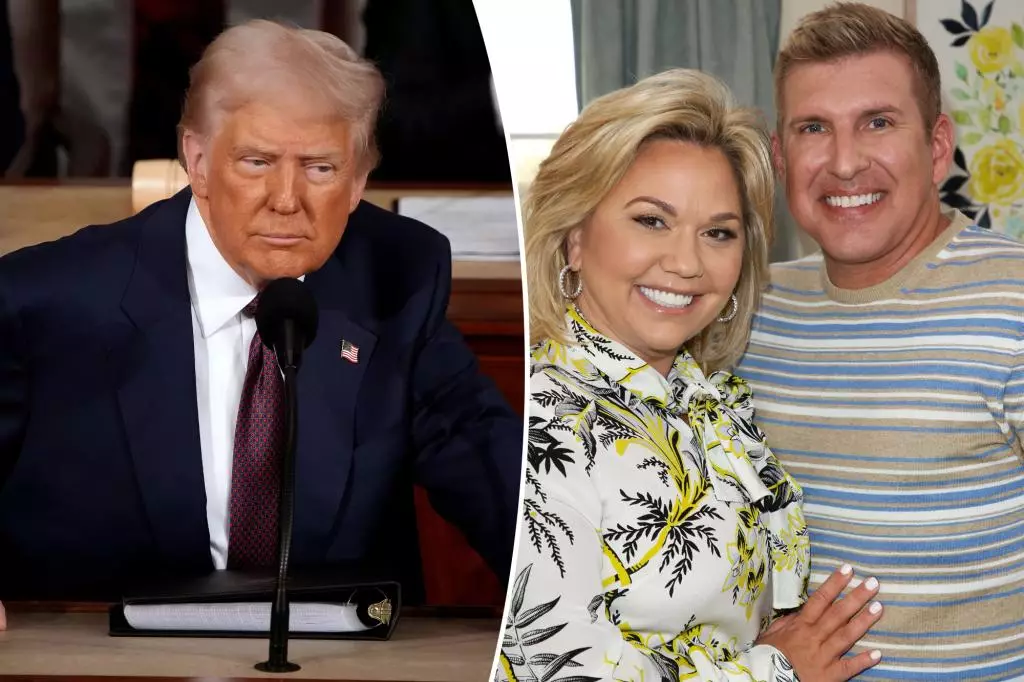In an unexpected twist in the realm of celebrity justice, Todd and Julie Chrisley, known for their reality TV show “Chrisley Knows Best,” have recently found themselves back in the spotlight after being pardoned by former President Donald Trump. The Chrisleys, who faced serious convictions for bank fraud and tax evasion, had their sentences lifted dramatically, spotlighting the intersection of fame, politics, and the American justice system. This high-profile case raises critical questions about the nature of justice and the peculiarities surrounding those who find their lives narrated through the lens of a reality television camera.
Released from separate federal facilities, Todd, 56, and Julie, 52, asserted their innocence even in the face of a jury’s unanimous verdict that labeled them as career swindlers. Prosecutors described a consistent pattern of deceit: submitting fake documents and evading the tax system, prompting a harsh sentencing that placed them behind bars for years. Yet, the narrative shifted rapidly when President Trump intervened, labeling the couple as victims of a judicial system that had overstepped its bounds. The dichotomy of their situation forces us to consider whether celebrity status affords certain individuals protections often denied to the common citizen.
The Power of Celebrity: Is Justice Equal for All?
Critics of the Chrisley pardons raise pertinent issues regarding the nuances of justice in America. The claims from their legal team that the couple faced “deep injustice” suggest that their case is emblematic of a broader, troubling trend wherein affluent, high-profile individuals receive leniency or special treatment. The assertion that they were targeted due to their “conservative values and high profile” introduces an unsettling argument about the influence of political affiliations in legal contexts.
Is justice genuinely blind, or does being in the public eye afford some leeway? This case ignites discussions about whether the legal repercussions of fraud should potentially be less impactful if one is well-known, thereby attracting the attention of the masses. The perception that positions of power and fame can manipulate legal outcomes is troubling and serves to embolden skepticism about the fairness of the judicial system.
A Pardon or a Political Stunt? The Implications of Trump’s Intervention
The method by which Trump announced the pardons—through a heartfelt video message to the Chrisley children—reinforces the question: was this pardon a genuine act of justice, or merely a political maneuver? It is difficult to ignore the implication that such actions exist within a realm of political favor-currying. Trump’s comments about the Chrisleys being “terrific people” raises eyebrows, prompting a critical examination of what constitutes merit in the realm of legal clemency.
Statements from their attorney, Alex Little, reiterate that the Chrisleys were “targeted” and had suffered at the hands of a biased judicial system. While one must acknowledge the potential for systemic bias, the juxtaposition of their celebrity against the gravity of their crimes complicates the conversation. Should public personas receive the red-carpet treatment in legal matters, or must the consequences of their actions be as profound as those faced by ordinary citizens?
The Role of Media in Shaping Perception
The manner by which the media has covered the Chrisleys’ journey from courtroom to freedom speaks volumes about their cultural relevance. The portrayal of Todd and Julie in the media has oscillated from villainous fraudsters to sympathetic figures subject to unfair treatment, underscoring the power of narrative and how it can sway public sentiment. The reality TV genre often enshrines its stars in a fame bubble, fortifying a flawed but enduring belief that success can sometimes overshadow accountability.
It’s essential to realize that as long as reality television continues to elevate individuals to celebrity status—often without accountability— the line between right and wrong becomes dangerously blurred. The Chrisley saga exemplifies the growing phenomenon of how celebrity culture can reshape the contours of justice. In a country where the constructs of fame intertwine intricately with legal ramifications, the dialogue about fairness remains both urgent and necessary.
As Todd and Julie embark on the next phase of their lives post-pardon, the broader implications of their case ripple through society, urging us to rethink our perceptions of justice, bias, and the inextricable ties of celebrity culture to the judiciary. This discourse is far from over, nor should it be—because the notion of justice truly being blind is increasingly proving to be more of an ideal than a reality.

